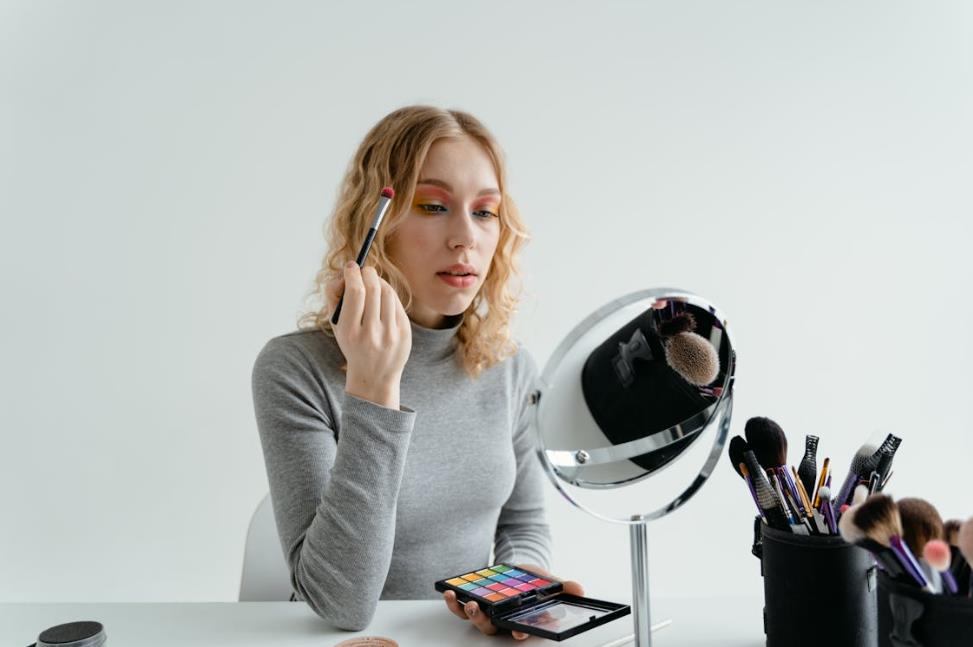The Psychological Impact of Makeup
Makeup, often viewed through the lens of aesthetics and fashion, has profound psychological implications. The process of applying makeup is not just a physical transformation but also a mental one. When individuals apply makeup, they engage in an act of self-care and self-expression, which can lead to enhanced self-esteem and confidence.
1. Self-Expression and Identity
Makeup allows individuals to express their personal style and identity. By experimenting with different looks, colors, and techniques, people can create a persona that resonates with their inner selves. This process of self-expression fosters a sense of autonomy and individuality, which is crucial for psychological well-being. When people feel that their outward appearance aligns with their inner identity, they experience a boost in confidence.
2. Control and Empowerment
Applying makeup provides a sense of control over one’s appearance. This control can translate into a feeling of empowerment. When people have the ability to alter or enhance their looks, they can project an image that aligns with their desired self-image. This empowerment is not just about changing one’s appearance but also about feeling capable and in command of one’s life. This sense of control can significantly boost confidence levels.
The Transformational Power of Makeup
Makeup has the ability to transform not just how others perceive us but also how we perceive ourselves. This transformational power can be harnessed to improve psychological self-image and overall confidence.
1. Enhancing Facial Features
Makeup techniques like contouring, highlighting, and shading can enhance or alter facial features, allowing individuals to achieve a look that they find more appealing or flattering. This enhancement can lead to a more positive self-image, as individuals see themselves in a light that aligns with their aesthetic preferences. Feeling good about one’s appearance can translate into greater self-assurance and confidence in social and professional settings.
2. Boosting Mood and Self-Esteem
The ritual of applying makeup can be a form of self-care that boosts mood and self-esteem. The act of investing time in one’s appearance can serve as a confidence booster, especially on days when self-esteem is low. This routine can create a sense of normalcy and control, which can be particularly comforting during stressful times. As a result, individuals may experience a more positive outlook and enhanced self-worth.
Makeup as a Tool for Psychological Self-Improvement
Beyond its immediate impact on appearance and self-esteem, makeup can serve as a tool for broader psychological self-improvement. By adopting certain makeup practices, individuals can cultivate habits and mindsets that contribute to long-term confidence.
1. Building a Positive Routine
Establishing a makeup routine can promote discipline and self-care. This routine becomes a daily ritual that encourages individuals to invest in themselves, fostering a sense of accomplishment and self-respect. The positive habits formed through a consistent makeup routine can extend to other areas of life, reinforcing a sense of self-worth and confidence.
2. Embracing Imperfections
Makeup can also teach individuals to embrace imperfections. The process of applying makeup involves both concealing and highlighting, which can help individuals accept and appreciate their unique features. By focusing on enhancing rather than hiding, people can develop a more positive self-image and learn to value their individuality.
Makeup and Social Perception
The way others perceive us can influence our own self-perception. Makeup can play a role in shaping these perceptions, leading to increased confidence through positive social feedback.
1. Influence on Social Interactions
People often feel more confident when they receive positive feedback from others. Makeup can enhance appearance and lead to more favorable social interactions. Compliments and positive attention can reinforce feelings of self-worth and boost confidence. This external validation, combined with the internal satisfaction of looking and feeling good, creates a powerful feedback loop that enhances overall self-confidence.
2. Navigating Professional Environments
In professional settings, makeup can contribute to a polished and professional appearance. This can lead to greater confidence in interactions with colleagues and superiors. When individuals feel that they present themselves well, they are more likely to project confidence and competence. This can influence how they are perceived and treated in professional environments, further boosting their self-esteem.
Conclusion
Makeup is more than just a tool for enhancing physical appearance; it is a powerful instrument for psychological self-improvement. By allowing individuals to express their identity, exert control over their appearance, and build positive routines, makeup can significantly impact self-confidence and self-esteem. Its transformative power extends beyond the surface, fostering a deeper sense of empowerment and self-worth.
As individuals embrace makeup not just as a cosmetic tool but as a means of personal expression and psychological growth, they unlock its full potential to enhance their confidence and overall well-being. Through mindful application and a positive approach to self-image, makeup can become a valuable ally in the journey toward greater self-assurance and self-improvement.
